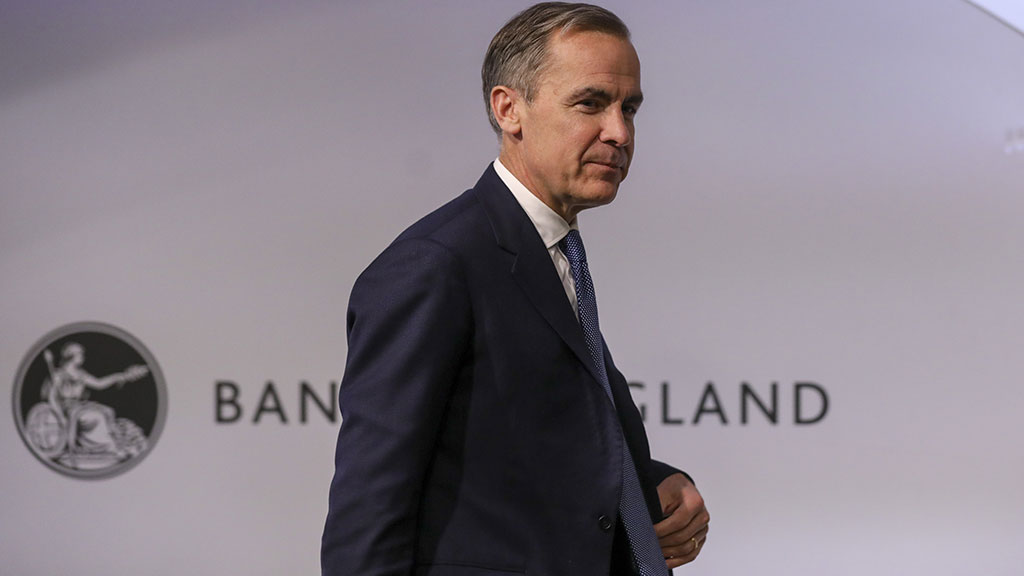Carney leaves the Bank of England, not with a bang, but a whimper
In Mark Carney's final rate-setting meeting as governor of the Bank of England, the Monetary Policy Committee has voted to keep interest rates where they are.


Get the latest financial news, insights and expert analysis from our award-winning MoneyWeek team, to help you understand what really matters when it comes to your finances.
You are now subscribed
Your newsletter sign-up was successful
Want to add more newsletters?
It looks like Mark Carney is stepping down as governor of the Bank of England without a final blast of fireworks.
The Bank’s Monetary Policy Committee (MPC) met this week to make its January decision on interest rates. It was Carney’s last meeting as governor. At noon, he announced the latest verdict: the MPC voted by seven votes to two, to keep the UK’s key interest rate where it is, at 0.75%.That’s quite a big deal market-wise. As Ruth Gregory of Capital Economics points out, just a few weeks ago, financial markets were convinced (or at least had the odds at 70%) that there would be a rate cut.
In the wake of the decision to keep rates on hold, sterling bounced somewhat (when monetary policy is tighter than markets expect, it’s usually good news for that country's currency, all else being equal). That’s not to say that the MPC feels relaxed about the economy, or that it expects growth to improve rapidly. Indeed, the Bank’s forecasts for growth and inflation have deteriorated since last time.
Try 6 free issues of MoneyWeek today
Get unparalleled financial insight, analysis and expert opinion you can profit from.

Sign up to Money Morning
Don't miss the latest investment and personal finances news, market analysis, plus money-saving tips with our free twice-daily newsletter
Don't miss the latest investment and personal finances news, market analysis, plus money-saving tips with our free twice-daily newsletter
So the possibility of a future rate cut is still live, while any potential for tightening still feels a long way off in the distance. The current decision to hold is very much data-dependent. Solid business survey data for January appears to have stayed the MPC’s hand.
But the Bank is ready to act “should the more positive signals from recent indicators of global and domestic activity not be sustained or should indicators of domestic prices remain relatively weak." However, for now at least, it appears that Carney is going out with a whimper, rather than a bang.
Get the latest financial news, insights and expert analysis from our award-winning MoneyWeek team, to help you understand what really matters when it comes to your finances.

-
 What do rising oil prices mean for you?
What do rising oil prices mean for you?As conflict in the Middle East sparks an increase in the price of oil, will you see petrol and energy bills go up?
-
 Rachel Reeves's Spring Statement – live analysis and commentary
Rachel Reeves's Spring Statement – live analysis and commentaryChancellor Rachel Reeves will deliver her Spring Statement today (3 March). What can we expect in the speech?
-
 UK wages grow at a record pace
UK wages grow at a record paceThe latest UK wages data will add pressure on the BoE to push interest rates even higher.
-
 Trapped in a time of zombie government
Trapped in a time of zombie governmentIt’s not just companies that are eking out an existence, says Max King. The state is in the twilight zone too.
-
 America is in deep denial over debt
America is in deep denial over debtThe downgrade in America’s credit rating was much criticised by the US government, says Alex Rankine. But was it a long time coming?
-
 UK economy avoids stagnation with surprise growth
UK economy avoids stagnation with surprise growthGross domestic product increased by 0.2% in the second quarter and by 0.5% in June
-
 Bank of England raises interest rates to 5.25%
Bank of England raises interest rates to 5.25%The Bank has hiked rates from 5% to 5.25%, marking the 14th increase in a row. We explain what it means for savers and homeowners - and whether more rate rises are on the horizon
-
 UK inflation remains at 8.7% ‒ what it means for your money
UK inflation remains at 8.7% ‒ what it means for your moneyInflation was unmoved at 8.7% in the 12 months to May. What does this ‘sticky’ rate of inflation mean for your money?
-
 Would a food price cap actually work?
Would a food price cap actually work?Analysis The government is discussing plans to cap the prices of essentials. But could this intervention do more harm than good?
-
 Is my pay keeping up with inflation?
Is my pay keeping up with inflation?Analysis High inflation means take home pay is being eroded in real terms. An online calculator reveals the pay rise you need to match the rising cost of living - and how much worse off you are without it.